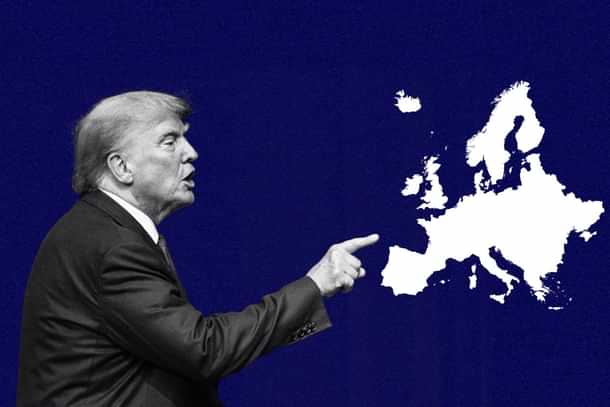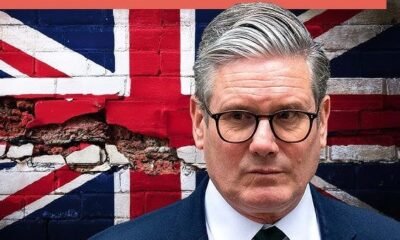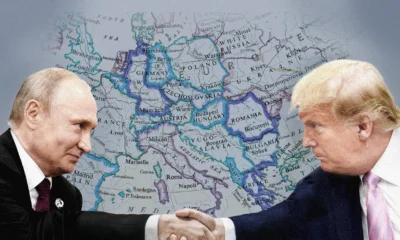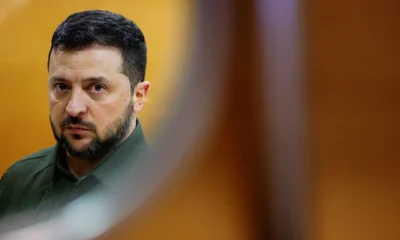Politics
Germany’s Friedrich Merz’s Big Balancing Act—Trump, Borders & Europe’s Future. Can He Deliver?
Published
5 hours agoon

Germany’s latest election results are in, and the conservative CDU/CSU has come out on top, paving the way for Friedrich Merz to become the next chancellor. Meanwhile, the far-right AfD has secured its best-ever result, coming in second. Voter turnout was an impressive 82.5%—the highest since reunification in 1990.
Now, the real challenge begins. Germany’s electoral system rarely hands out absolute majorities, meaning Merz and his party will have to negotiate a coalition. And that’s where things could get tricky—it might take weeks or even months before a final government is in place.
Merz Promises… Germany & Europe
One of the biggest flashpoints in Merz’s agenda is immigration. There’s a growing sentiment in Germany (and across Europe) that borders are too porous, pushing voters toward more extreme parties. And unlike Angela Merkel, who famously said, “Wir schaffen das” (We can do this) when she opened Germany’s doors to refugees, Merz is taking a hardline stance.
He has vowed to shut down borders to undocumented migrants as his first priority in office. He’s even rolled out a five-point migration plan aimed at tightening asylum laws—even if it means violating EU regulations and international agreements like the Geneva Convention.
Earlier this year, Merz introduced a resolution in Parliament to ramp up border pushbacks. While it passed, it only did so with support from the AfD—shattering the long-standing “firewall” that kept mainstream parties from working with the far right. A binding version of the bill was later rejected, but not before former Chancellor Merkel came out of political retirement to condemn her CDU colleague.
If his campaign promises are anything to go by, Merz’s chancellorship could mark a major shift in Germany’s refugee and migrant policies.

Breaking Away from Trump’s America & Strengthening Europe
Just before the election, Merz made headlines with a blunt warning – Europe needs to prepare for a world where Trump no longer guarantees NATO’s mutual defense.
In a televised interview, he said, “We must have discussions with the British and French—the two European nuclear powers—about whether their nuclear protection should extend to us.”
His vision? A stronger Europe that’s not reliant on the U.S. for security. Merz has also floated the idea of European Union-wide borrowing for defense spending—something Germany has traditionally been wary of.
When asked about his stance, he made it clear – “I’m open to debates about resources, but I won’t let this just be about money.”
A Big Win for Ukraine
Friedrich Merz’s victory is great news for Ukraine. He’s been a vocal supporter of Kyiv in its fight against Russia and has made it clear that his government would continue backing Ukraine. In fact, he’s pushing for Germany to send long-range Taurus cruise missiles—something Olaf Scholz refused to do.
Unlike Scholz, Merz also seems open to the idea of deploying German troops to Ukraine, either as a deterrent or part of a peacekeeping force—something Scholz dismissed as “completely premature.”
Merz is likely to greenlight Ukrainian forces targeting deep inside Russian territory with German weapons—something that’s been a major red line for Berlin until now.
Overall, experts agree that Merz will take a much tougher stance on Russia and Vladimir Putin than his predecessor ever did.
Merz’s U-Turn on Nuclear Energy
Germany has spent years phasing out nuclear power, shutting down reactors, and scrambling to replace Russian gas imports with renewables. But Merz? He’s signaling a shift.
While it’s unlikely that Germany will restart its closed nuclear plants, Merz’s friendlier stance toward atomic energy could help pro-nuclear EU nations push Brussels to treat it more like renewables.
At the same time, he wants to scrap Germany’s Building Energy Law, which was designed to speed up the transition to cleaner heating. This move is a clear signal to climate skeptics across Europe that Germany may slow down its green ambitions.
Climate Change Takes a Backseat
A Merz victory isn’t great news for climate advocates. He’s made it clear that economic growth will take priority over environmental policies, even calling for a rollback of several EU green regulations.
On the campaign trail, he repeatedly raised concerns about how climate policies affect businesses, suggesting that Germany won’t be as aggressive in pushing green reforms under his leadership.
With Merz at the helm, Germany may step away from its ambitious climate commitments—something that could have ripple effects across the EU.

What a Conservative Win Means for Germany-China Relations
Merz has promised a tougher stance on China, warning that investing in the country carries “great risk” for German businesses. He’s even grouped China with Russia, North Korea, and Iran as part of an “axis of autocracies.”
But while his rhetoric is strong, the reality is more complicated. As Zsuzsa Anna Ferenczy, an assistant professor at Taiwan’s National Donghua University, points out, German voters want economic recovery.
China remains one of Germany’s biggest trading partners, and with the German economy struggling, a drastic policy shift could hurt more than help. Merz may talk tough, but economic pressures might force him to take a more pragmatic approach.
A Blow to the Cannabis Movement
Merz’s victory also spells trouble for Germany’s cannabis movement. He’s pledged to reverse the 2024 policy that partially decriminalized possession, blaming the law for a rise in drug-related crime.
Under the current law, adults can carry up to 25 grams of cannabis in public and grow up to three plants at home. But if Merz follows through on his promise, Germany could see a major rollback of its cannabis laws.
Will AfD Be Part of the Coalition Government?
Germany’s next government will almost certainly be a coalition—because that’s how the numbers work. But one party that is virtually guaranteed to be left out? The hard-right Alternative for Germany (AfD).
Despite early exit polls placing the AfD in second place, riding on its anti-migration stance and deportation promises, all mainstream German parties have committed to keeping it out of power. This exclusion, known as the firewall, is rooted in Germany’s post-World War II efforts to prevent extremist forces from gaining a foothold in government.
And the reasons for this firewall? They’re not just political. Parts of the AfD have been officially classified as extremist by German intelligence, some members have been convicted for using Nazi slogans, and others have been arrested for attempting to overthrow the federal government. Just recently, an AfD election volunteer greeted canvassers with a Nazi salute—in front of a New York Times reporter.
Germany has, so far, been one of the few major European nations to successfully block its hard-right party from power—France being another, where strategic voting stopped the National Rally from gaining a majority. But in other European nations like the Netherlands, Hungary, and Italy, such firewalls have collapsed.
Adding to the debate, U.S. Vice President JD Vance recently stirred controversy by urging European nations, including Germany, to work with hard-right parties instead of shunning them. “There is no room for firewalls,” he declared in Munich.
So far, Germany’s major parties—including Friedrich Merz’s CDU—have reaffirmed their commitment to keeping AfD out. But if the AfD performs even better than expected, crossing the 20% mark, the pressure could mount. At that point, the firewall may face its toughest test yet.
You may like
-


United Kingdom To Unleash Its ‘Harshest’ Sanctions On Russia Yet—But Will They Bite? How Trouble Is Brewing For Keir Starmer At Home. Shamed For Volunteering British Troops In Ukraine
-


How It’s Not Trump But Vladimir Putin That Europe Is Stinging From: Trump’s U-Turn On Europe, Russia’s Strong Supply Chain—A Formidable Opponent!
-


Is Ukraine Now Stuck In The US-Russia Ecosystem? Could Zelensky Have Made A Deal To Stop The War, Is Trump Right?
-


Why Is Donald Trump Still Reiterating $21 Million USAID Funding To India, Although It Went To Bangladesh? What Game Is Trump Playing And Why?
-


Is AI Rigging German Elections? The Rise Of AfD, And How Young Voters Are Powering AfD’s Surge On Social Media
-


China’s Economy On Its Way To Recovery? Alibaba Shares Soar 11% After Stellar Earnings, Marking an E-Commerce Revival—But What About the Pained Real Estate Sector?
